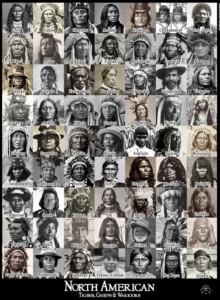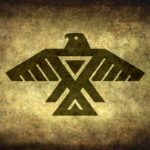Drawing the Ojibwe ancient Midewiwin symbology since age 5, this affirmation couldn’t be any clearer.
 [Excerpt from a book The Tribes of North America pg 500-501]
[Excerpt from a book The Tribes of North America pg 500-501]
The exonym for this Anishinaabe group is Ojibwe (plural: Ojibweg). This name is commonly anglicized as “Ojibwa” or “Ojibway”. The name “Chippewa” is an alternative anglicization. Although many variations exist in the literature, “Chippewa” is more common in the United States, and “Ojibway” predominates in Canada, but both terms are used in each country. In many Ojibwe communities throughout Canada and the U.S. since the late 20th century, more members have been using the generalized name Anishinaabe(-g).
The exact meaning of the name Ojibwe is not known; the most common explanations for the name derivations are:
- ojiibwabwe (/o/ + /jiibw/ + /abwe/), meaning “those who cook/roast until it puckers”, referring to their fire-curing of moccasin seams to make them waterproof.[5]
- ozhibii’iwe (/o/ + /zhibii’/ + /iwe/), ᐅᔑᐲ’ᐃᐌ meaning “those who keep records [of a Vision]“, referring to their form of pictorial writing, and pictographs used in Midewiwin sacred rites;[7] or
- ojiibwe (/o/ + /jiib/ + /we/), meaning “those who speak stiffly” or “those who stammer”, an exonym or name given to them by the Cree, who described the Ojibwe language for its differences from their own.[8]
Because many Ojibwe were formerly located around the outlet of Lake Superior, which the French colonists called Sault Ste. Marie for its rapids, the early Canadian settlers referred to the Ojibwe as Saulteurs. Ojibwe who subsequently moved to the prairie provinces of Canada have retained the name Saulteaux. This is disputed since some scholars believe that only the name migrated west.[9] Ojibwe who were originally located along the Mississagi River and made their way to southern Ontario are known as the Mississaugas.[10]



Recent Comments